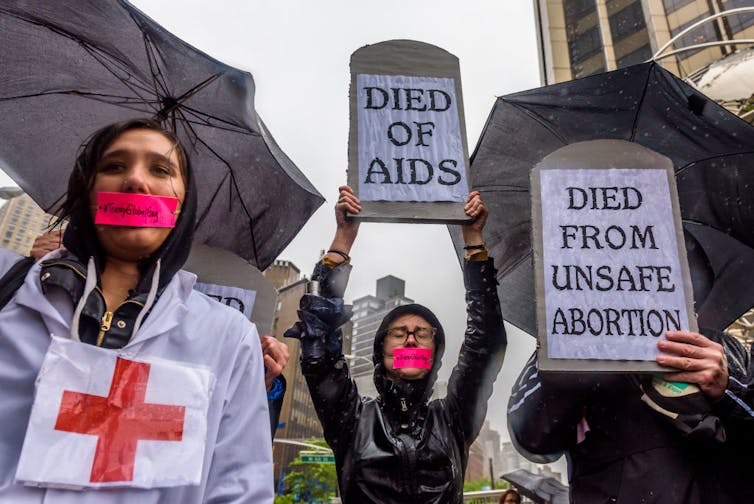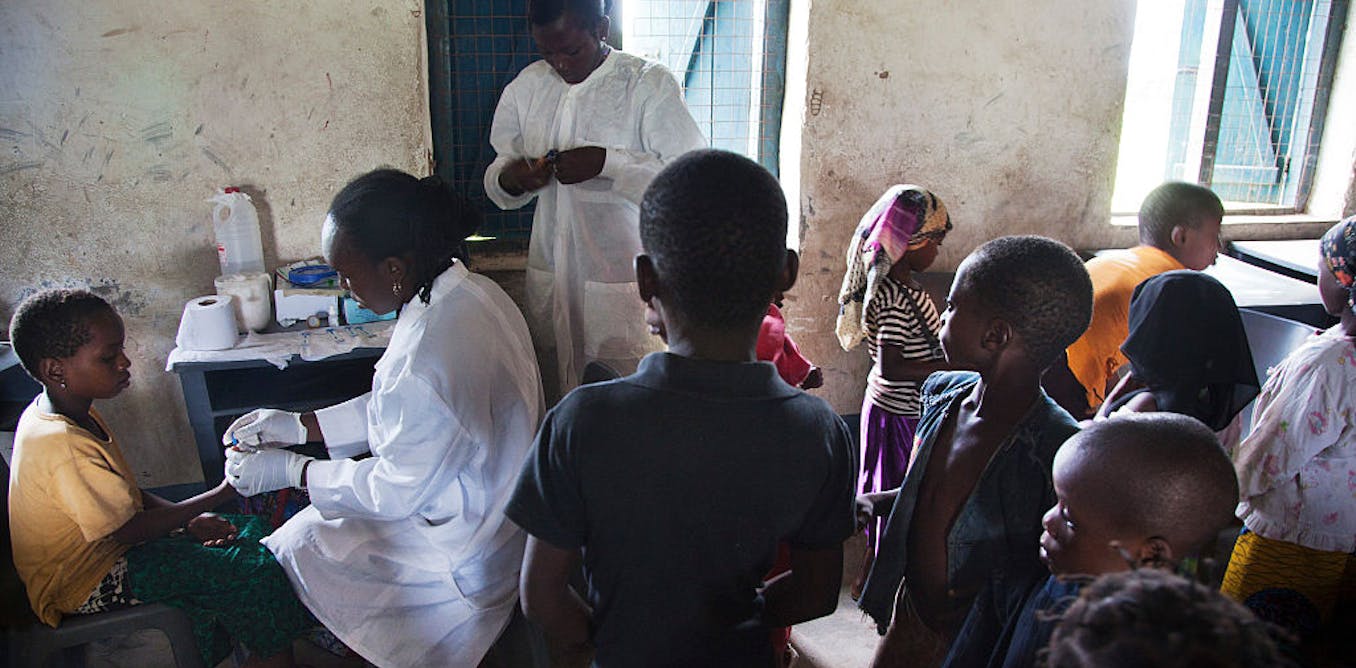A little over two decades ago, addressing Nigeria’s HIV crisis topped U.S. President George W. Bush’s priorities. Africa’s most populous nation had 3.5 million HIV cases, and the disease threatened to destabilize the region and ultimately compromise U.S. interests. These interests included securing access to Nigeria’s substantial oil reserves, maintaining regional military stability and protecting trade partnerships worth billions.
Following years of agitation from AIDS activists, Bush launched the President’s Emergency Plan for AIDS Relief, or PEPFAR, in 2003. This U.S.-led HIV treatment program has since saved tens of millions of lives around the globe.
While living in Nigeria for my work as a medical anthropologist, I witnessed PEPFAR’s rollout and saw firsthand how the powerful therapies it provided transformed Nigerian lives. The women I worked with told me they could finally put aside the fears of death or abandonment that had consumed their days. Instead, they could focus on a newly expanded horizon of possibilities: building careers, finding love, having healthy children.
Now, however, a serious threat to preventing and treating HIV worldwide looms. The Trump administration’s decision to substantially restrict access to a vital HIV prevention tool – PEPFAR-funded preexposure prophylaxis, or PrEP – would cut off ongoing treatment for millions of people and block future access for countless others who need this protection.
The timing is devastating: Scientists recently made a major advance in HIV prevention. Named the 2024 Breakthrough of the Year by the journal Science, the drug lenacapavir offers six months of HIV protection with one injection. Unlike previous PrEP options that required daily pills, which created significant barriers to consistent access and adherence, this twice-yearly injection dramatically simplifies prevention.
By undermining access to a treatment that has been essential to reducing HIV rates, the Trump administration’s new restrictions threaten to derail two decades of bipartisan investment in eliminating HIV globally. The consequences extend well beyond individual lives.
Afterlife of aid
“Some people that have it, they choose to be wicked and just spread it all around,” confided Elizabeth, a woman I interviewed during my time in Nigeria. I am using a pseudonym to protect her privacy. “They say, ‘Somebody gave it to me, so I am going to spread it too.’ But if they know that they can live positively with the virus, it would reduce their evil thoughts.”
Elizabeth’s words reveal a concerning dynamic: When hope for treatment disappears, a dangerous desperation can take its place. Patients who feel abandoned by health care systems might lose motivation to protect others from HIV. They may also stop seeking medical care, abandon prevention measures and turn away from future aid.
Cultural anthropologists use the phrase “the afterlife of aid” to describe what happens after global aid programs are withdrawn or drastically reduced. Communities are left not just without resources but with a lasting sense of betrayal that undermines their willingness to seek help, creating cycles of skepticism that can persist for generations.
Treatment as hope
In my fieldwork, I’ve witnessed how managing life with the virus involves far more than taking medications. It requires carefully navigating personal relationships, family obligations, cultural expectations and hopes for the future.
Many of the women I worked with had contracted HIV from their husbands or boyfriends. Some even suspected their partners’ positive status but were unable to protect themselves. Before these medications, women – both HIV positive and HIV negative – had to choose between risking rejection or risking transmission.
Saurabh Das/AP Photo
Elizabeth and David’s story illustrates these challenges. They had been together for more than a year when David proposed. “When I sensed he was serious about marriage, I knew I had to tell him my status,” Elizabeth told me during one of our many conversations. Though initially shocked, he remained committed to their relationship.
Elizabeth had maintained a decade of careful adherence to her HIV treatment, but the couple still struggled with consistent condom use. David described using condoms as akin to “eating candy with the wrapper still on it.” He also was eager to have a baby. While PrEP had greatly reduced transmission risk, it placed the full burden of protecting her husband on Elizabeth.
The path Elizabeth navigated highlights how Nigerian cultural expectations complicated their situation. When proving one’s fertility is often considered essential to establishing gender identity, the pressure to have sex without protection created additional tension. Moreover, Elizabeth’s need to balance her own health needs with her husband’s desires reflected the delicate negotiation many Nigerian women face between personal well-being and marriage.
As Elizabeth prepared for the birth of their child, she expressed both joy and anxiety: “I have to stay healthy for both of them now.”
Politicizing global health
Previous interruptions in aid foreshadow what’s at stake when shifts in U.S. political priorities compromise global health funding.
Consider the global spike in maternal and child mortality when President Ronald Reagan instituted the Mexico City Policy, often referred to as the “global gag rule.” It blocked U.S. funding to all international nongovernmental organizations that provided or even referred abortion services.
This policy has been repeatedly implemented by Republican administrations – including those of George H.W. Bush, George W. Bush and Donald Trump during his first term – and subsequently rescinded by Democratic presidents, creating a disruptive cycle of funding uncertainty. Among these affected organizations are recipients of PEPFAR funds.
The human cost of this policy pendulum is measurable and significant. Researchers have found that when this law is enacted, nations across the globe suffer increased death rates for newborns and mothers as well as jumps in HIV cases. In countries heavily dependent on U.S. aid, the Mexico City Policy has resulted in approximately 80 additional child deaths and nine additional maternal deaths per 100,000 live births annually and about one additional HIV infection per 10,000 uninfected people.

Erik McGregor/LightRocket via Getty Images
My research in Nigeria also reveals the fragile progress that now hangs in the balance. Before treatments arrived, HIV ravaged Nigerian communities. In 2001, nearly 6% of the population had HIV, totaling around 3.5 million people. The Hausa language reflected this trauma: Terms for AIDS also meant “lifeless body” and “nearby grave.”
Following the rollout of HIV treatments, Nigeria’s cases dropped dramatically – by 2010, prevalence had fallen to 4.1%. Declines continued steadily as treatment access expanded from 360,000 people in 2010 to over 1 million by 2018. This progress was heavily dependent on international support, with PEPFAR and other global donors providing over 80% of the US$6.2 billion spent fighting HIV in Nigeria between 2005 to 2018.
In 2019, around 1.3% of the population had HIV, or 1.9 million people.
From personal choice to global security
What’s at stake isn’t just increasing HIV rates. The Trump administration’s reductions in foreign aid threaten to unravel over two decades of U.S. investment in global security and economic growth.
Public health crises rarely stay contained within national boundaries. When health systems fail in West Africa, diseases can quickly spread overseas and require costly emergency responses. The 2014 Ebola outbreak demonstrated this reality, when cases reached America and prompted a $5.4 billion emergency response. Similarly, the 2009 H1N1 influenza pandemic, which infected around 60 million Americans, showed how quickly infectious diseases circle the globe when surveillance and containment systems are inadequate.
Inconsistent aid, in turn, undermines American global leadership and creates openings for competing powers to establish their influence. China has actively exploited these gaps, establishing bilateral trade with Africa reaching $295 billion in 2024. While the U.S. reduced its global health engagement during previous administrations, China expanded its global health diplomacy, partnering on issues ranging from infectious disease prevention and control to health emergency response and health technology innovation.
Meanwhile, restrictions in PrEP access risk recreating the same impossible choices women faced at the advent of the epidemic: choosing between disclosing their status and risking abandonment; accepting unprotected sex and risking transmission, or refusing unprotected sex and risking violence or loss of economic support.
I believe the result is a far less safe world where preventable suffering continues, hard-won progress unravels and the promise of an AIDS-free generation remains unfulfilled.




